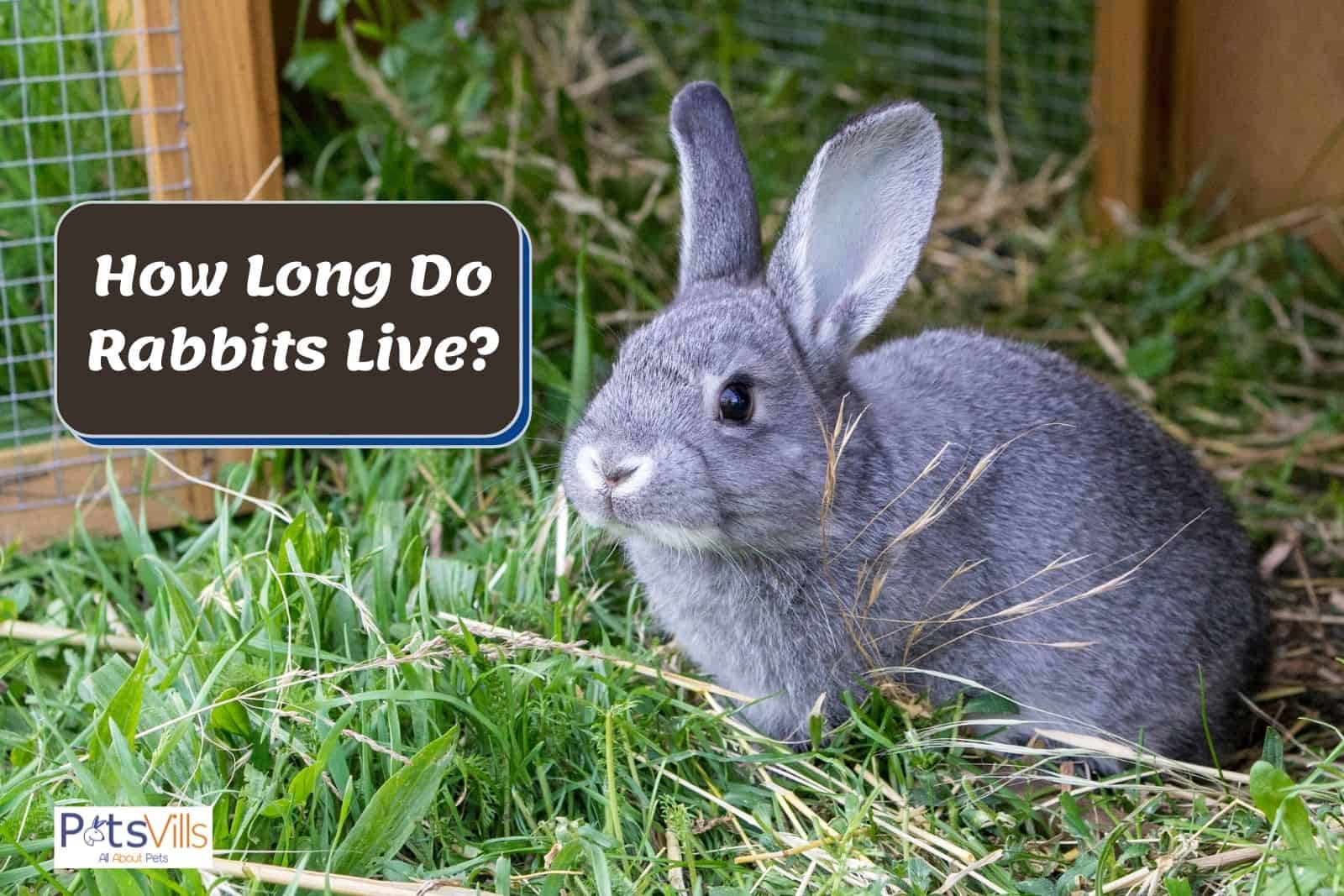Rabbits can make excellent pets. They’re social, interactive, and can be very affectionate towards their owners. Owning a rabbit takes a lot of work and effort.
To ensure your rabbit is healthy and lives as long as possible, you need to provide it with outstanding care.
Related: Care Tips For Pet Rabbits
How long do rabbits live? With good care, rabbits tend to live for 7 to 10 years in captivity. Wild rabbits only live for 1 to 2 years due to predators and other hazards.
Read on to learn more about rabbits’ life expectancy and the factors that influence how long they live!
What is a Rabbit’s Life Expectancy?
Rabbits typically live for 7 to 10 years in captivity [1].
Although, some sources state it is not uncommon for rabbits to live over 12.
In the wild, rabbits normally only live for 1 to 2 years.
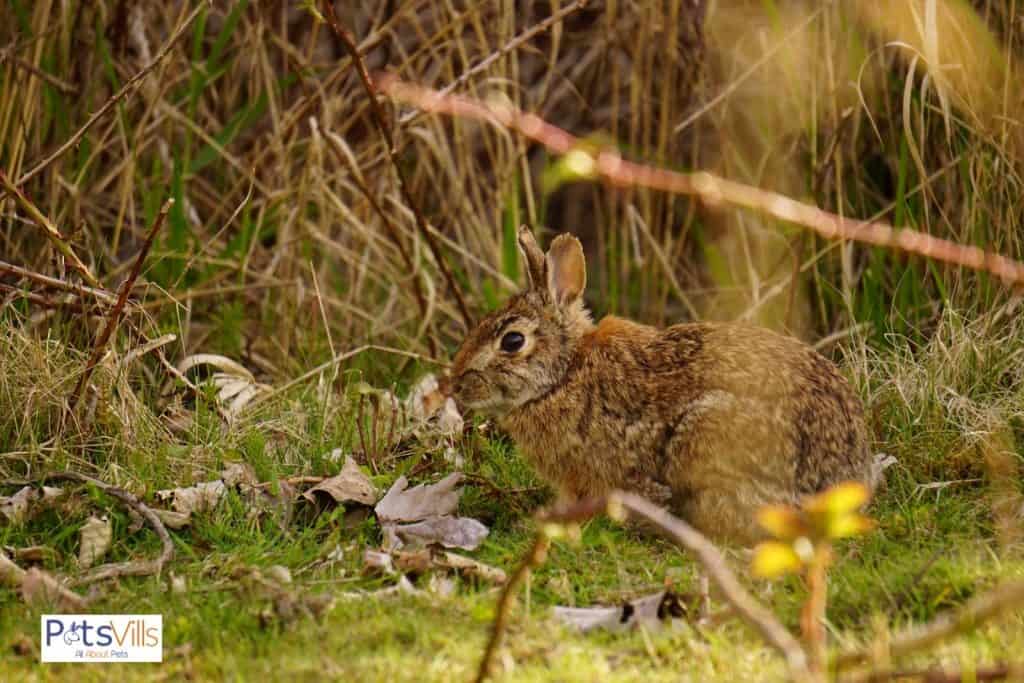
The wild is full of dangers and hazards for rabbits, such as predators and cars.
However, pet rabbits are free from these types of dangers to living for a lot longer!
There are a lot of factors that influence how long your rabbit lives, including diet, exercise, habitat, and health.
For your rabbit to live as long as possible, you need to make sure they are happy and healthy by providing them with a well-balanced diet [2], good exercise, and a spacious habitat.
Some health problems cannot be avoided entirely, mainly due to bad genetics or old age.
Feeding and caring for your rabbit correctly will significantly improve your rabbit’s overall health.
READ MORE: Are Rabbits Good Pets For Kids
A Rabbit’s Life Cycle
A male rabbit is called a buck, and a female rabbit is called a doe. Baby rabbits are referred to as kittens or kits for short.
Male rabbits become sexually mature at around four months old [3], while females become sexually mature at about three and a half months.
Rabbits will generally mate in the spring and summer months. This is because the temperature is warm, and more food is available, which increases baby rabbits’ (kits) chances of survival.
Female rabbits are pregnant for around 30 days. They can breed and become pregnant again as soon as they have delivered their kits.
Females rabbits usually have 3 to 7 kits per litter, though it is not unheard of for them to have more.
A female rabbit can have a litter every month during the mating season. Kits are born blind, deaf, and without fur.
At around ten days old, kits can open their eyes. At roughly 18 days old, kits will begin to wander out of their burrow to feed on plant matter.
Related: Do Rabbits Have Eye Problems?
Between 21 to 25 days old, kits will gradually be weaned off their mother’s milk. They will usually stay close to their den until around 4 to 5 weeks old.
After this age, young rabbits will leave their mother’s den to start their own lives.
Once a rabbit reaches around five months old, they are considered an adult and fully grown.
Rabbits are considered elderly or senior when they are over five years old. However, the majority of wild rabbits will seldom reach their second birthday.
Here’s a video of a rabbit’s life cycle.
The Oldest Rabbit in the World (Guinness World Records)
The oldest rabbit in the world [4] that the Guinness World Records have recognized is Mick. Mick was 16 years old on the 9th of February 2019.
Mick is an agouti rabbit from Berwyn, Illinois, USA. Mick’s owner is Liz Rench, who has owned rabbits for many years.
“I’ve been caring for rabbits for 20 years and have never had a rabbit live beyond 13. Mick is extremely special, and I feel lucky to have him in my life!” says Liz.
This shows that with excellent care, your rabbit could live for a very long time!
You can read more about Mick the rabbit through the Guinness world record’s website.
Their Diet Matters – How a Good Diet Affects Your Rabbit’s Lifespan
Rabbits need a well-balanced diet for them to thrive. Good-quality grass hay should be the main component of your rabbit’s diet.
Rabbits require hay to keep their digestive system working efficiently. Hay also provides your rabbit with fiber and nutrients to keep them healthy.
Your rabbit should have constant access to hay. Make sure your rabbit never runs out of hay too much on!
In addition to hay, your rabbit should be given leafy green vegetables and a small portion of rabbit pellets/nuggets each day.
Rabbit muesli is best avoided as it typically contains a high-fat level. It is also known to cause dental problems and stomach issues.
Store-bought rabbit muesli contains harmful ingredients like flaked maize, seeds, and grains. These are not good for your rabbit’s health.
Seeds are a choking hazard and can become lodged in your pet’s teeth and digestive tract.
Pellets are much more nutritious and healthier for your rabbit.
Leafy Green Vegetables, Fruits And Treats
Leafy green vegetables should be given to your rabbit daily.
Around one adult-sized handful of leafy green vegetables is a good portion size.
You should offer between 4 to 5 different types of leafy green vegetables.
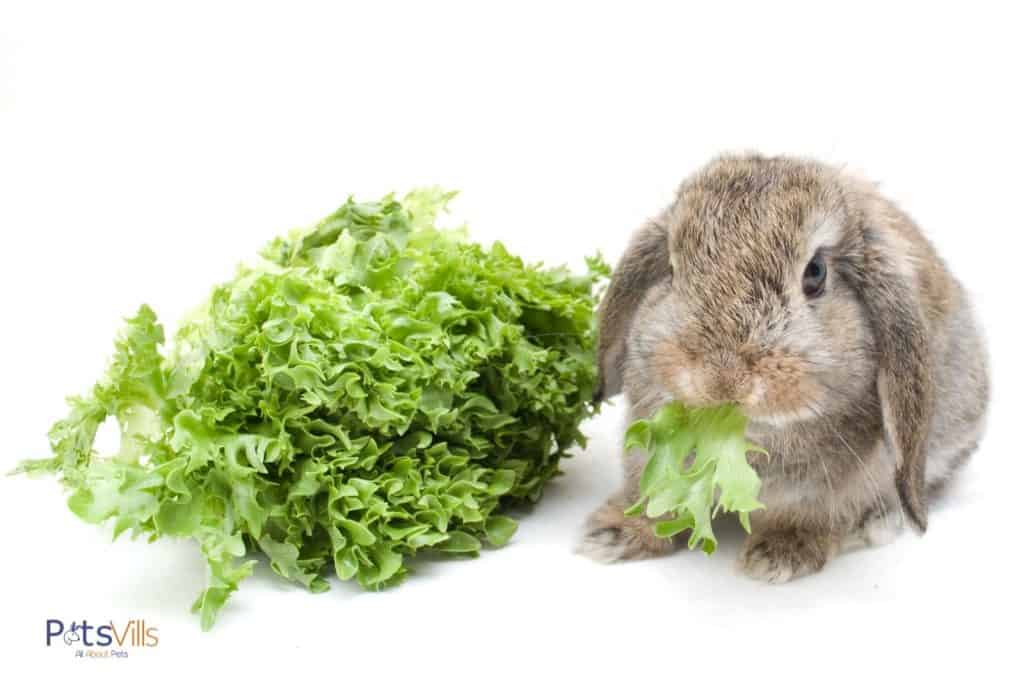
Make sure you rotate the leafy green vegetables you feed your rabbit regularly.
Fruits and root vegetables (like carrots) should only be fed occasionally to your rabbits. They contain a lot of sugar, which can be detrimental to your rabbit’s health if consumed in large quantities.
Feeding fruits or root vegetables a couple of times a week is more than enough for your rabbit. Only feed them in small amounts (about two tablespoons is an adequate portion).
Store-bought treats should not be fed regularly to your rabbit as they are typically caloric and contain a lot of sugar and fat.
Feed store-bought treats very sparingly and no more than once or twice a week. Fruits or veggies are a healthier alternative to feed your rabbit when you want to reward them.
Lastly, make sure your rabbit always has access to clean water. You should change your pet’s water every day.
Don’t use water collected from puddles, streams, rivers, etc. Only use tap, bottled, or filtered water.
A poor diet can shorten your rabbit’s lifespan [5]. If you make sure your rabbit has a nutritious and well-balanced diet, then it will be healthier in the long run!
Make Sure Their Cage is Big Enough
A good-sized cage or habitat is vital for your rabbit’s health. One rabbit needs at least 12 square feet of living space and around 32 square feet of exercise space.
A good-sized cage or hutch should be able to fit all the bare essentials in, such as food dishes, toys, a hideaway, and a drinking bottle/bowl.
Your rabbit should be able to lay down and stretch as well as stand up without its head or ears reaching the top of the cage/hutch.
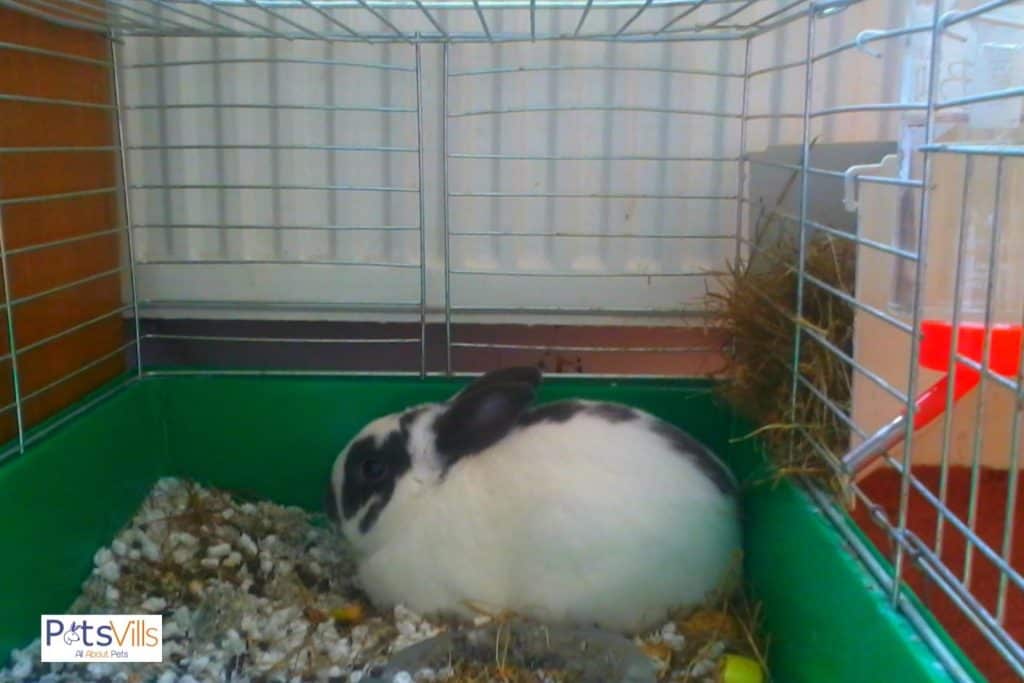
If you own multiple rabbits, you will need to give them more living space.
Owning multiple rabbits in a tiny enclosure will likely cause aggression and territorial issues.
Bigger is always better, so try and provide your rabbit with as much space as you can.
Provide Them With Lots Of Exercise
Rabbits are incredibly energetic animals that need a lot of exercise to keep them fit and healthy.
Exercise provides your rabbit with mental stimulation, as well as a way to burn off steam.
Your rabbits need at least 3 hours of exercise each day. Using a run or playpen inside or outside is ideal for exercising your pet.
Make sure the run or playpen is large and spacious. An 8 ft x 4 ft x 4 ft is the minimum size a run or playpen should be for your rabbit.
If you don’t provide your rabbit with regular or adequate exercise, they will become agitated, depressed, and bored. Low activity levels can also result in various health issues in rabbits.
Your rabbit needs exercise to keep in shape. Without exercise, your rabbit is likely to become overweight, leading to a lot of complications.
Check our guide about how much exercise does a bunny need!
Health Problems That Could Affect Your Rabbit’s Lifespan
There are a lot of health problems [7] rabbits can experience, which can affect or shorten their lifespan.
Here are a few health issues to watch out for that can affect your rabbit’s lifespan.
Obesity
Obesity in rabbits is usually caused by a poor diet and lack of exercise. Rabbits need a lot of grass hay in their diets, supplemented with leafy green vegetables and good-quality pellets.
If rabbits consume too many sugary or fatty foods (like fruits and store-bought treats), they are likely to become overweight.
Obesity in rabbits can cause many complications, such as heart disease, hepatic lipidosis, and myiasis. As well as leading to many health issues, obese rabbits also have a shortened lifespan without treatment.
That’s why a well-balanced diet is vital for your rabbit’s health. If you notice your rabbit is putting on weight, take them to the vet to rule out other health issues.
If your rabbit’s weight gain is due to a poor diet and lack of exercise, then your vet will be able to advise you with a feeding and exercise plan.
GI stasis
This disease is typically caused by poor diet and low activity levels. GI stasis is when your rabbit’s digestive system stops working correctly and slows down [6].
This causes harmful bacteria to build up in your rabbit’s intestines, which causes bloating. GI stasis can be fatal if it is severe or not treated.
Common causes of gut stasis include poor diet (lack of fiber and too much fat/carbs), lack of exercise, lack of water, mobility issues (such as obesity), and stress.
Signs of GI stasis include loss of appetite, bloating, lethargy, small/oddly-shaped faeces, or inability to pass feces.
If you notice your rabbit displaying these symptoms, then take them to a vet as soon as possible.
Make sure you exercise your rabbit every day for at least 3 hours and feed them a well-balanced diet to try and prevent GI stasis from occurring.
Flystrike/myiasis
Flystrike or myiasis in rabbits is an awful and life-threatening condition. Flystrike happens when flies (typically the green bottle fly) lay their eggs on damp areas on your rabbit’s skin.
Flies are attracted to urine, faeces, and moist fur, so they will usually lay their eggs around your rabbit’s bottom. These eggs will hatch into maggots within 24 hours and will begin to eat away at your rabbit’s flesh (and release nasty toxins as a result).
Flystrike is usually fatal, so if you suspect your rabbit has it, take them to a vet as soon as possible.
Flystrike is much more common in the summer months. To help prevent his disease, your rabbit’s living areas must be kept clean.
Don’t let your rabbit sit on soiled bedding or live in an unclean environment. It would be best if you clean your rabbit’s cage or hutch at least once a week.
If your rabbit’s cage is small, then you will need to clean its habitat out more than once a week (the same goes for owning multiple rabbits).
Using a rabbit cage liner can help simplify this process, as it can be easily replaced to maintain a clean and comfortable environment for your pets.
Spot cleaning regularly can make cleaning your rabbit’s cageless time-consuming. Spot cleaning involves removing soiled bedding daily.
This means there will be a lot less mess to tidy up when you have to do a full clean of your rabbit’s enclosure!
If your rabbit is overweight or elderly, they may be unable to clean themselves properly. If this is the case, you will have to clean your rabbit yourself.
When fed in large quantities, fruits and veggies can cause diarrhea (which will attract flies!) in rabbits, so make sure you don’t overfeed them.
FAQs
Can rabbits live with other animals like guinea pigs?
No. You should never house or introduce other animals to your rabbit, even guinea pigs. Rabbits should only live with other rabbits.
Are rabbits friendly?
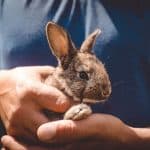
Rabbits can make very friendly and affectionate pets if they are bonded with their owner and tamed.
Can rabbits live outside?
Rabbits can live outside all year round. However, you should consider bringing your rabbit inside during bad weather and winter months and ensure their hutch is protected from rain, wind, and snow.
Resources
- 1. How Long Do Rabbits Live As Pets? [Internet]. WebMD. [cited 2022 Jan 25]. Available from: https://pets.webmd.com/how-long-do-rabbits-live
- 2. Feeding your rabbits [Internet]. www.pdsa.org.uk. [cited 2022 Jan 25]. Available from: https://www.pdsa.org.uk/pet-help-and-advice/looking-after-your-pet/rabbits/feeding-your-rabbits
- 3. Animal Husbandry :: Breeding of rabbit [Internet]. Tnau.ac.in. 2021. Available from: https://agritech.tnau.ac.in/animal_husbandry/animhus_breeding%20of%20rabbit.html
- 4. Meet Mick, the world’s oldest rabbit who is 16 years old [Internet]. Guinness World Records. 2019 [cited 2022 Jan 25]. Available from: https://www.guinnessworldrecords.com/news/book/2019/3/meet-mick-the-worlds-oldest-rabbit-who-is-16-years-old-563690#:~:text=Following%20his%2016th%20birthday%20on
- 5. Rabbit Food | House Rabbit Society [Internet]. Rabbit.org. 2017. Available from: https://rabbit.org/faq-diet/
- 6. Gastrointestinal Stasis in Rabbits – Intestinal Blockage [Internet]. www.petmd.com. Available from: https://www.petmd.com/rabbit/conditions/digestive/gastrointestinal-stasis-rabbits-it-really-hairball-causing-blockage
- 7. Disorders and Diseases of Rabbits – All Other Pets [Internet]. Veterinary Manual. Available from: https://www.msdvetmanual.com/all-other-pets/rabbits/disorders-and-diseases-of-rabbits
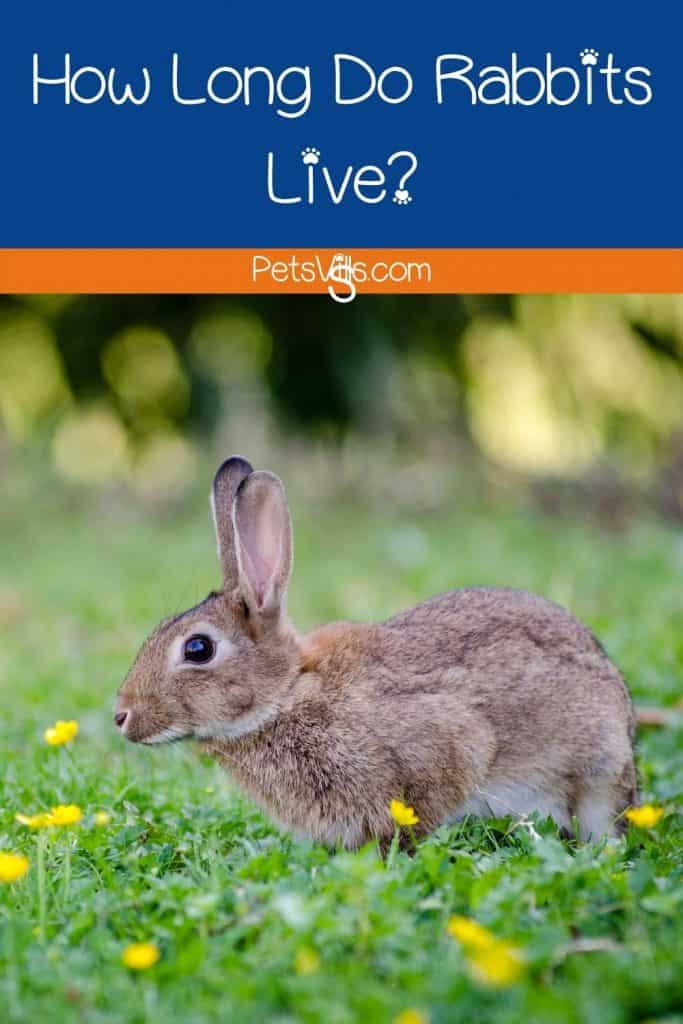
How long do rabbits live? Please share your opinion!
Barry Stingmore is a British content writer living in Fuerteventura, Spain. An animal lover at heart, he shares his home with a dog and four rescue cats and has a passion for writing about animals big and small.
Barry loves finding answers to your animal-related questions, the more research involved the better! You can rely on him to find the facts.
Find him on FACEBOOK, TWITTER AND Linkedin
Read his latest ARTICLES.
Find more about him HERE.

